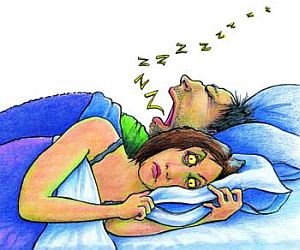Puerto Vallarta, Mexico - Here is a wake-up call to the millions of men and women with type two diabetes: Snoring at night or nodding off during the day may be symptoms of sleep apnea. Sleep apnea is a potentially life-threatening problem affecting one out of three people with diabetes. Based on evidence linking the two disorders, health experts are encouraging physicians to assess their diabetic patients for sleep apnea symptoms and to screen sleep apnea sufferers for metabolic disease.
"It is probably too early to see any concrete evidence of changes in practice, but there is little doubt that the importance of screening people with diabetes and people with sleep apnea for the other condition is rising," says Dr. Jonathan Shaw, lead author of the IDF task force and associate professor at the International Diabetes Institute in Melbourne, Australia.
Sleep apnea occurs when a person's airway becomes blocked during sleep. It is usually caused by the collapse of soft tissue in the back of the throat during sleep. Between snores, breathing stops for a period of 10 seconds or longer, and this pattern may repeat itself multiple times over the course of a night. Not only does it deprive the person of a good night's sleep, but it may increase the risk for high blood pressure and heart disease.
Obstructive sleep apnea affects just 2 percent of women and 4 percent of men in the general population, the International Diabetes Institute notes. But, it is much more prevalent among people with diabetes.
In a recent report in the journal Endocrine Practice, researchers examined data from 279 men and woman with type two diabetes. Overall, 36 percent had obstructive sleep apnea. Men with diabetes were particularly vulnerable. Men younger than age 45 had more than a one-third increased chance of developing sleep apnea. After age 65, the risk doubled. For women younger than 45, the chances of having sleep apnea were negligible: between 5 percent and 8 percent. Females 65 and older, however, had a one-third increased chance of having the sleep disorder, according to the study.
The study suggests that once you're diabetic, there's such a powerful disposition to obstructive sleep apnea that the other contributing variables are simply less important. Diagnosing and treating sleep apnea is critical to successfully managing a person's diabetes so if you are diabetic, find a professional and have an over-night study performed. It could change your life, and potentially save it.
Wellness begins with a good night sleep. PV Sleep Well specializes in testing for sleep apnea. We are also a supplier of CPAP equipment and accessories, available for sale or rent. For additional information or to schedule a screening contact info(at)pvsleepwell.com.
 Visit PVSleepWell.com to learn more about sleep apnea, the solutions that are available and the services they offer, then contact PVSleepWell and take the first step to a better night’s sleep, to a better life! PVSleepWell can be reached in Puerto Vallarta at 52-322-117-2255 or by emailing Info(at)PVSleepWell.com.
Visit PVSleepWell.com to learn more about sleep apnea, the solutions that are available and the services they offer, then contact PVSleepWell and take the first step to a better night’s sleep, to a better life! PVSleepWell can be reached in Puerto Vallarta at 52-322-117-2255 or by emailing Info(at)PVSleepWell.com.Click HERE to learn more about PV Sleep Well.



